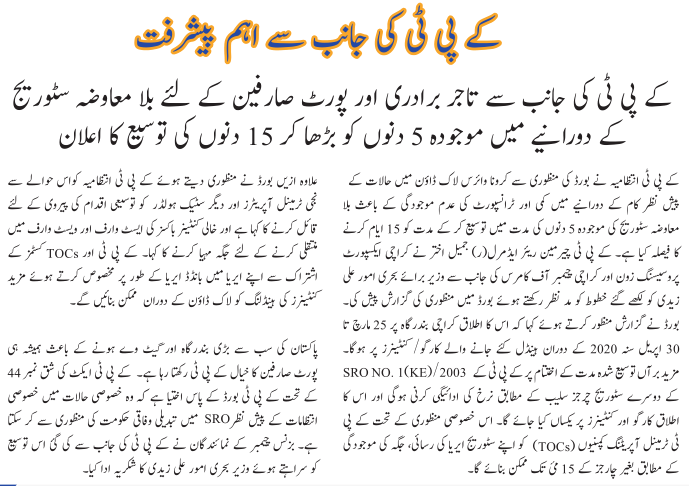KPT grants 15-day free storage for cargoes amid lockdown
KARACHI: Karachi Port Trust (KPT) has granted importers free access to its storage spaces for two weeks to lessen their demurrage burden that swells due to lack of transportation amid lockdown, it was learnt on Tuesday.
Minister for Maritime Affairs Ali Zaidi said the decision was taken in view of hardships being faced by businesses due to COVID-19.
“KPT will also allow the terminal operating companies (TOCs) to utilise KPT storage area to accommodate excessive containers subject to availability of space,” Zaidi said in a tweet.
“TOCs will be additionally allowed to utilise KPT land till May 15 for the containers landing between March 25 and April 30, 2020.”
The federal cabinet extended the free time to provide relief to the business community.
“However, on expiry of this period and for the containers landing between 25/03/2020 to 30/04/2020, the second slab of charges in lieu of demurrage will come into effect,” a statement said. “TOCs will be allowed to utilise the storage space of KPT during this period and even after expiry of the time the storage space will not be denied till 15th of May, 2020. TOCs will be facilitated to shift their laden boxes to west and east wharves during the lockdown subject to the availability of the space.”
KPT, in coordination with customs authorities, would designate different locations as bonded areas as per requirements to accommodate landed boxes during the lockdown period.
Karachi port, which handles 76 percent of cargoes, saw containers pile up with the traders not furnishing essential documents to get their consignments cleared due to lack of goods transportation amid coronavirus-led lockdown.
Usually, around 10,000 containers land at ports every day. The number came down 30 percent in the last couple of days. But, still more than 6,000 containers are landing at the ports each day, and not all of them are being cleared. `
Traders said the incentive would not help many importers as majority of cargoes are handled at private terminals that refused to waive demurrage and extend free period. Besides, no such directives were issued to the Port Qasim Authority, they said.
“Around 80 percent of the imports land at private terminals,” Khurram Aijaz, vice president of the Federation of Pakistan Chamber of Commerce and Industry (FPCCI) said. “The suspension of demurrage during this period is an incentive for owners of cargoes to accelerate the process of taking delivery of their cargoes.”
Aijaz said the ministry didn’t direct private terminal operators or shipping lines to waive demurrage and detention charges.
“We have been requesting these terminal operators and shipping companies to only waive the surcharge and not the principal amount of rent, because the circumstances are not in anyone’s control,” he said. “They impose exorbitant penalties for overstaying of containers, which sometimes exceed the value of the imported goods.”
Aijaz said private terminals and shipping companies have monopoly and persistently dared government’s writ. “Demurrage and detention have been waived by the companies in neighbouring countries, so why not in Pakistan.”
Trader Naveed Qadir said private container terminals and shipping companies disregarded the ministry’s advisory to waive demurrage and container rent over and above the free period for any delay in loading/unloading operations or evacuation/arrival of cargoes for reasons attributable to the lockdown measures.
Qadir said international trade almost stopped and there is no demand of empty containers, but the shipping companies are still claiming connection charges from importers. “FPCCI, Karachi Chamber of Commerce and Industry, Customs authorities and even the ministry of maritime affairs advised them to waive additional charges, but they are firm in their stance.”
Customs agents and traders complained about the absence of proper precautionary measures against COVID-19 at the offices of terminals and shipping companies, where agents and importers have to line up for hours to take delivery orders.
An official said terminals are witnessing severe congestion due to slow clearance of imported cargo, and yet the operators are reluctant to waive penalties despite the fact such a waiver would incentivise clearance of cargoes.
Importers have already started shifting their consignments to bonded warehouses to avoid additional costs at ports. Dutiable goods can be stored at bonded warehouses without payment of import taxes for a period of six months. Importers only pay taxes on the quantity of goods removed from the warehouses. As such, traders pay taxes in parts avoiding immediate burden of taxation.


